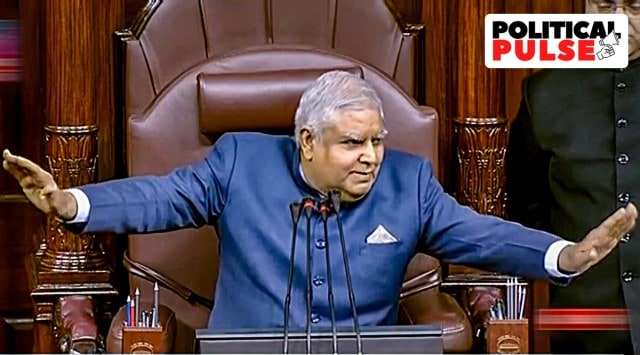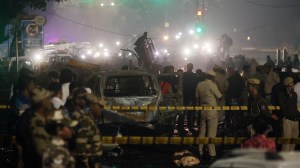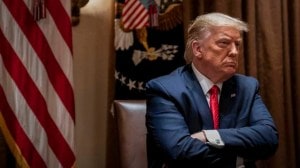When Jagdeep Dhankhar presides over a House
As Congress accuses the Vice-President of overstepping his duties as Rajya Sabha Chairman, and “replying on behalf of govt”, a look at the functions and powers of the presiding officer of the Upper House
 Vice President Jagdeep Dhankhar conducts proceedings in the Rajya Sabha during Budget Session of Parliament, in New Delhi. (PTI)
Vice President Jagdeep Dhankhar conducts proceedings in the Rajya Sabha during Budget Session of Parliament, in New Delhi. (PTI) As Leader of the Opposition in the Rajya Sabha and Congress president Mallikarjun Kharge Wednesday targeted the Centre and Prime Minister Narendra Modi over the allegations against the Adani Group, one active interjector was House Chairman and Vice-President Jagdeep Dhankhar.
As Dhankhar repeatedly stepped in to counter Kharge, Congress members asked how the Rajya Sabha Chairman could reply on behalf of the government.
When Kharge’s demand to set up a joint parliamentary committee to look into the matter led to protests by BJP members, Dhankhar intervened to say that the Rajya Sabha was a platform to be only used to say “that which is in national interest”.
Kharge said there was nobody more nationalistic than him: “I am more patriotic than any of you… I am a bhoomiputra (son of the soil). I am mool Bharati.’’
As other Opposition members also protested, and Kharge’s remarks were expunged, Congress MP Jairam Ramesh asked the Chairman to expunge his own remarks.
When Kharge brought up the Hindenburg Report accusing the Adani Group of fraud and stock manipulation, and questioned how its wealth had “seen an increase by 13 times”, Dhankhar asked Kharge to “authenticate’’ his claims. “I can’t allow anyone to use this platform for freefall of information without authenticating and providing documentation,’’ he said.
The Chairman added: “Just because any report comes from anywhere in the world, can we do anything based on such reports?… You are giving the right to anyone (in the world) to scrutinise our (India’s) institutions.”
When Kharge asked the Modi government why it was promoting the Adani Group, which employs far fewer people than the public sector, Dhankhar again responded. He said India had a robust system to check the award of any irregular contracts to any agency. “I have got inputs from senior quarters inside and outside the country that Parliament should not be used to run down our transparent, accountable and robust mechanism,” he said.
Congress MP Jairam Ramesh was heard saying: “You cannot reply for the government”.
Powers and Functions of Chairman
As per the Rajya Sabha website, the Chairman of the Rajya Sabha or the Vice-President “is the unchallenged guardian of the prestige and dignity of the House”. “He is also the principal spokesman of the House and represents the collective voice to the outside world. He ensures that the proceedings of the House are conducted in accordance with the relevant constitutional provisions, rules, practices and conventions…” As part of his duties, he “ensures that Members’ rights of asking questions and receiving complete replies is well enforced and gives rulings on privilege matters and other procedural points”.
The rules add, “The Chairman is not bound to give reasons for his decisions. The Chairman’s rulings cannot be questioned or criticised and to protest against the ruling of the Chairman is a contempt of the House.”
Role in the Deliberations of the House
As regards this, the rules say: “The Chairman does not take part in the deliberations of the House except in the discharge of his duties as the Presiding Officer. However, on a point of order raised or on his own, he may address the House at any time on a matter under consideration with a view to assisting members in their deliberations.”
Maintenance of Order in the House
The rules call this “the fundamental duty of the Chairman”, adding, “he has been invested with all the necessary disciplinary powers under the rules for the purpose, such as checking irrelevance or repetition in the speech of a member, intervening when a member makes an unwarranted or defamatory remark by asking him to withdraw the same. The Chairman may also order expunction of any unparliamentary or undignified words used in the debate, or order that anything said by a member without his permission would not go on record. He may direct any member guilty of disorderly conduct to withdraw from the House and name a member for suspension….”






- 01
- 02
- 03
- 04
- 05

























